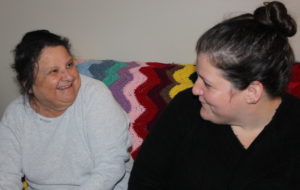Jul 14
The Art of Conversation with Older Adults

Humans are social beings. Even if one is considered an introvert, we all need and crave interaction and connection. “Conversations are supposed to be fun. They involve personal interactions between two or more people about something of interest. But many people worry about having conversations. They are concerned that they won’t be able to keep the conversation going, or about what they will say.” (Excerpt from Conversation Skills) Our older loved ones have a wealth of stories, wisdom, and memories to share. They are also interested in everything about your life. Depending on your elder loved one’s situation, some of these tips may help make your conversations more enjoyable.
- Think about whether your loved one has any hearing challenges. If yes, sit so that they can see your face easily for visual clues and lip reading. Be aware of not covering your mouth with your hand as you make gestures. Eliminate background noise from TVs or radios. Speak clearly and perhaps in a louder voice than you might with someone who isn’t hearing impaired, but don’t shout. Be patient if your loved one asks you to repeat something that they didn’t hear clearly. You can find more tips on talking with someone who has hearing loss here.
- Does your loved one have any dementia or memory challenges? If yes, take into consideration what time of day is best to sit and chat. Is your loved one more coherent earlier in the day? Repetition of questions or conversation is one of the most common dementia behaviors and one of the most frustrating for family and friends. As much as possible, patiently repeat the same answer to questions. You might offer some visual clues to help the person remember. Circle a date on a paper calendar and write the title of the event that your loved one keeps asking about. Warmly redirect the conversation to something that doesn’t require the person to think ahead. Instead of what do you want for dinner, you might consider talking about favorite foods. If short term memory is the challenge but longer-term memory is still intact, then talk about something in the past. “Tell me about what you did on your favorite vacation as a young adult.” You can find more tips on communicating with someone who has dementia here.
- Even if your loved one doesn’t have hearing or memory challenges, it can feel difficult to know what to talk about with someone who is at a very different life stage than you are. In this case, we suggest you think about some conversation starters. You may be surprised how these questions lead to fascinating conversations that engage your loved ones and help you learn things that you never knew about them. Here are some sample questions to get you started:
- What do you do to make the world a better place?
- When you were little, who took care of you when you weren’t at school?
- If you could choose one song to be your “anthem,” what would it be and why?
- What sports do you or have you enjoyed playing? What about watching?
- When have you had to stick up for someone or something you believed in? What motivated you?
- What is a rule you try to live by? Do you remember where and when you learned it?
These questions, which were shared with Springwell by an organization called Bridges Together (no longer in existence), can help create meaningful dialogue between people of all ages and social backgrounds. If you enjoy talking with older adults, you may want to learn more about Springwell’s Friendly Visitor Program. Happy Conversing!


